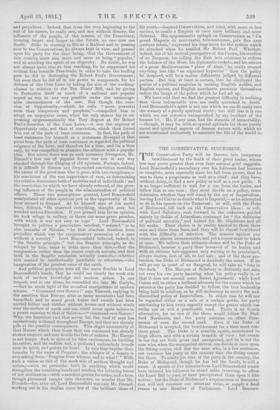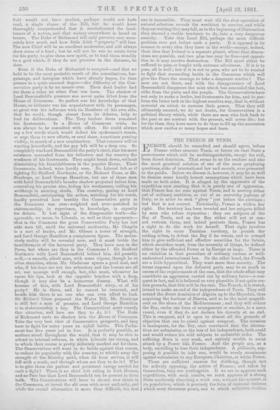THE CONSERVATIVE SUCCESSION.
THE Conservative Party will be thrown into temporary.
bewilderment by the death of their great leader, whose. loss may prove greater than even their natural grief suggests. Lord Beaconsfield's ascendancy over his followers had become so complete, more especially since his fall from power, that he was to them a programme as well as a chief ; and they have, without delay, to find a new policy as well as a new guide. It is no longer sufficient to wait for a cue from the leader, and follow that as one man ; they must decide on a policy, must
determine whether they will stand by the cry of Imperialism,. leaving Lord Cairns to decide what is Imperial,—as he attempted to do in his speech on the Transvaal ; or will, with the Duke,
of Richmond, fall back on old Conservative ideas ; or will, with Lord Salisbury, rush forward to the unknown, guided mainly by dislike of Liberalism, contempt for "the delicacies of political morality," and hatred for Mr. Gladstone and all his works. Their choice is in reality limited to those three men and those three lines, and they will be almost bewildered with the difficulty of selection. The reasons against any course are almost unanswerable, and yet a course must be taken at once. We believe their ultimate choice will be the Duke of Richmond, because a party thus bereaved of its leader, and with no obvious heir-apparent only waiting to be proclaimed,. always desires, first of all, to feel safe ; and of the three pre-- tenders, the Duke of Richmond is decidedly the safest. If he will go out in quest of no Sangreal, he will take no "leap in the dark." The Marquis of Salisbury is distinctly not safe, not even his own party knowing what his policy really is, or
that it does not conceal some Secret Agreement ; while Lord Cairns will be either a brilliant advocate for the course which he, perceives the party has decided to follow, the true leadership. being held in solution, or he will endeavour to revive the now discredited policy of Imperialism. In either case he will not be regarded either as a safe or a certain guide, his party attributing to him every capacity except the genius which can strike out at will a practicable road. There is no fourth alternative, for no one of the three would follow Sir Staf- ford Northcote, and the party contains no other Com- moner of even the second rank. Even if the Duke of Richmond is accepted, the bewilderment for a time must con- tinue great. The Duke is a sensible squire, accustomed to large affairs, and with a certain breadth of view ; but events in our day are both great and unexpected, and he is not the man who, when the unexpected arrives, can decide at once upon the fitting course, still less the man who, in a few sentences, can convince his party or the country that the fitting course lies there. To ninety per cent, of the party in the country, the Duke of Richmond, though he has led the Lords, is still a name, A speech of five minutes from Lord Beaconsfield would have induced his followers to stand aside, frowning, to allow the Land Bill to pass, or have precipitated them upon it like wolves ; but the Duke of Richmond's acquiescence or denuncia- tion will not convince one reluctant voter, or supply a final reason to one Member of Parliament. Lord Beacons,
field. would not have studied, perhaps would not have read, a single clause of the Bill, but he would have thoroughly comprehended that it revolutionised the land- tenure of a nation, and that society everywhere is based on tenure. The Dille of Richmond will only perceive very accu- rately how much and how little Irish " property" will lose. The new Chief will be an excellent moderator, and will always show sense of a kind ; but he will not be one to create force for his party, to give them new spirit, or to lead them steadily to a goal which, if they do not perceive in the distance, he does.
Even if the Duke of Richmond is accepted—and that we hold to be the most probable result of the consultations, bar- gainings, and ietrigues which have already begun, for time presses to a quite unusual degree—the difficulty of the Con- servative party is by no means over. Their dead leader had for them a value no other Peer can have. The shadow of Lord Beaconsfield's presence was never quite lifted from the House of Commons. So perfect was his knowledge of that House, so intimate was his acquaintance with its personages, so great was his influence with its Members of his own side, that he could, though absent from its debates, help to load its deliberations. The Tory leaders there remained his lieutenants, In a House of Commons crisis, he was always to be consulted with effect, He could always say a few words which would deflect his spokesmen's course, or urge them to new efforts, or send them. sometimes panting visibly, in search of a new combination, That resource will be wanting henceforth, and the gap left will be a deep one. So completely was Lord Beaconsfield the party's chief, that his mere existence concealed from his followers and the country the weakness of his lieutenants. They might break down, without diminishing his formidableness in the popular House. Their lineament, indeed, were hardly seen. No Liberal felt as if fighting Sir Stafford Northcote, or Sir Richard Cross, or Mr. Stanhope, or Lord George Hamilton, but one of those men with Lord Beaconsfield's broader shadow projected before him, concealing his precise size, hiding his weaknesses, veiling his writhings in assuring shade. The country, gazing at Lord Beaconsfield, anticipating his action, watching for his words, hardly perceived how terribly the Conservative party in the Commons was over-weighted and over-matched in statesmanship, in experience, in knowledge, in capacity for debate. It lost sight of the disagreeable truth—dis- agreeable, we mean, to Libeeals, as well as their opponents— that in the Commons the great Conservative Party has lost able men till, amid the universal mediocrity, Mr. Chaplin is a sort of leader, and Mr. Gibson a tower of strength, and Lord George Hamilton a conspicuous figure. The melan- choly reality will be revealed now, and it must treble the bewilderment of the bereaved party. They have men in the Peers, but where are they in the Commons ? Sir Stafford Nortimote with Lord Beaconsfield behind him did passably well,-.--a smooth, adroit man, with some vigour, though he so of ten stumbles, whom Mr. Gladstone spares a good deal, and who, if his boys are not too refractory and the lessons are all set, can manage well enough, but. who must, whenever he opens his lips, look at the opposite benches with a deep, though it may also be a humorous dismay. What will become of him, with Lord Beaconefield away, or of his party ? He is there, and he cannot be removed, and beside him there is no one who can even affect to lead. Sir Richard, Cross prepared the Water Bill, Mr. Stanhope is *till but a man of promise, and Lord George Hamilton is in statesmanship a boy. The Conservatives must remedy this situation, and how are they to do it? The Duke of Richmond casts no shadow into the House of Commons.
Take the very best view of Conservative prospects, and they have to fight for many years an uphill battle. This Parlia- ment has five years yet to live. It is perfectly possible, as matters stand throughout the world, that it may be able to attend to internal reforms, in which Liberals are strong, and in which their course is pretty definitely marked out for them. The Conservatives will want to do battle against that course, to reduce its popularity with the country, to whittle away the strength of the Ministry until, when its hour arrives, it will fall with a crash and through whom are they to do it ? Who is to give them Le patient and persistent energy needed for such a fight ? There is no chief left ruling in both Houses, and no Peer less than Lord Beaconsfield can be present in them both, The Conservatives will have to choose new chiefs in the Commons, or invest the old ones with more authority, and while the second alternative is more than difficult, the first one is impossible. They must wait till the slow operation of natural selection reveals the worthiest to survive, and while they are waiting they may fall, as in the beginning of Obstruction they showed a visible tendency to do, into a very dangerous anarchy. Take this Land Bill, perhaps the most difficult problem ever put before such a party. It is opposed in its essence to every idea they have in the world—except, indeed, their idea that Ireland is a separate planet, whore four dimen- sions are possible, and two plus two may he five—yet opposi- tion to it may involve destruction. The Bill must either be suffered to Pass, or fought with extreme adroitness. If it is to pass, all is well ; but if it is not to pass, who are to be trusted to fight that resounding battle in the Commons which will give the Peers the courage to take a desperate resolve ? The men are not there, and with the disappearance of Lord Beaconsfield disappears the mist which has concealed the fact, alike from the party and the people. The Conservatives have not only to make a leader, but lieutenants for him, and to per- form the latter task in the highest creative way, that is, without material on which to exercise their power. That they will ultimately succeed, we do not doubt, for Conservatism is a political theory which, while there are men who look back to the past or are content with the present, will never die ; but for the time, they have more to do than to fill up the succession which now excites so many hopes and fears.



































 Previous page
Previous page